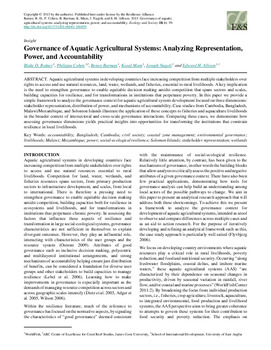Governance of aquatic agricultural systems: Analyzing representation, power, and accountability

Citation
Ratner, B.D. et al. (2013). Governance of aquatic agricultural systems: Analyzing representation, power, and accountability. Ecology and Society, 18(4): 59
Aquatic agricultural systems in developing countries face increasing competition from multiple stakeholders over rights to access and use natural resources, land, water, wetlands, and fisheries, essential to rural livelihoods. A key implication is the need to strengthen governance to enable equitable decision making amidst competition that spans sectors and scales, building capacities for resilience, and for transformations in institutions that perpetuate poverty. In this paper we provide a simple framework to analyze the governance context for aquatic agricultural system development focused on three dimensions: stakeholder representation, distribution of power, and mechanisms of accountability. Case studies from Cambodia, Bangladesh, Malawi/Mozambique, and Solomon Islands illustrate the application of these concepts to fisheries and aquaculture livelihoods in the broader context of intersectoral and cross-scale governance interactions. Comparing these cases, we demonstrate how assessing governance dimensions yields practical insights into opportunities for transforming the institutions that constrain resilience in local livelihoods.
Permalink
Date Available
Type
Publisher
Countries
Language